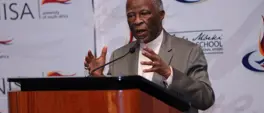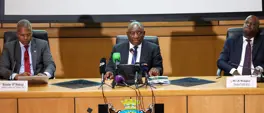OPINION: The importance of keeping alive the issue of landlessness, especially after elections
Bwanika Lwanga and Kolosa Ntombini
17 June 2024 | 11:47How a State treats its most vulnerable citizens is an important marker of its ideological leaning and governing agenda, write Bwanika Lwanga and Kolosa Ntombini.
“It is common for most of us to be naked when we bath, Dan Plato, and most of us do so without fear of having our doors knocked in by masked gunmen, on instruction from bureaucrats with a deep disdain for the poor.”
This statement by Ayabonga Cawe captures the spirit of how jarring it was to see the videos of a naked Bulelani Qolani’s living quarters being pulled apart by the authorities.
Four years later, in April 2024, fires ravaged more than 1,000 homes in Kayamandi.
One of the residents, Asemahle Matyholo, remarked: “Living in shacks is another thing. One moment you have a home the next moment it’s gone just like that. Now, we have to rebuild, but we are never safe or secure.”
These incidences, albeit under different leadership and circumstances, share an important commonality: the precarity that underlies living without registered housing and land.
Through the ballot, citizens have recorded their wishes and given the political class a mandate to govern together. We wake to what seems like a new country and hope it will address the persisting residues of the old. How a State treats its most vulnerable citizens is an important marker of its ideological leaning and governing agenda.
In the context of long-standing issues, such as access to land and the imperative to address spatial injustice, it is important to delineate occurrences that, despite the passage of time, are relevant and require the attention of the various role players as we approach this ‘newer’ dawn.
It is important to reflect more seriously on the relationship between the State and people who live in informal settlements.
A cornerstone of this reflection is an analysis of the historical patterns of dispossession, which render people living in informal settlements in a state of perpetual violation and vulnerability. The existence of informal settlements is intertwined with a long history of precarity owing to colonial land wars and the violent evictions which characterised apartheid.
Modern-day South Africa still contends with migration patterns built on the oscillation between what were known as Bantustans, and economic hubs such as Cape Town and Johannesburg. To participate in the economic value chain, people leave their homes and are systematically placed in precarious living environments, which despite their risks, are closer to economic activity.
It is easier to look for work and meet the demands of employment when one stays closer to places of commercial activity. The State, through economic and spatial policies, presides over this reality, and seems invested in maintaining the status quo. This is evidenced by how the State engages with landless people outside election cycles.
Conversely, during election season, we saw politicians visit informal settlements as part of their campaign strategy and appear on the scene when fires and natural disasters struck informal settlements. We also saw politicians listen to people’s challenges and seem empathetic as they promised a better life.
However, outside of election cycles, the resilient issue of landlessness and spatial precarity for most South Africans remains unchanged, hence the need for sustained discourse. Regardless of election cycles, those without land are caught in the difficult choice between remaining in the economic periphery or facing difficult spatial circumstances in the hopes of wading through an affront of several forms of indignity, in the hopes of eventually escaping the grips of poverty.
Accordingly, the relationship between the State and vulnerable people can be understood as an extractive one that places several interests before the well-being of vulnerable people. When affluent role players complain of the inconvenience of having landless people in their proximity or on their land, it is the State, through court orders and police enforcement, that actions removal and displacement of vulnerable people.
In doing so, the State demonstrates a greater interest in the property values of the affluent while placing more of a burden on vulnerable people, who must now commute further to get employment and spend as much as 40% of their income on transport costs. As such, until there is meaningful redress in this regard, we will witness various iterations of the same indignity visited on Qolani and Asemahle Matyholo every couple of years.
Perhaps because of the backlash following the incident involving Qolani, the police will be less brazen. Still, they will continue to move the poor to protect the property of the rich and the elements will continue to destroy informal infrastructure.
Addressing the relationship between the State and those without secured land rights is fundamental to the evolution of our democracy. Meaningful change requires an understanding that having a right to land is fundamental.
As Stuart Elden argues, land is the site and stake of struggle, which is to say that most of our basic life endeavours are impossible without having a place to stay. This is why Qolani’s removal was so jarring, and the sentiments of Ms Matyholo that emanated from the same precarity four years later were a continuation of the same issue.
Having a place to stay enables us to exercise many of the rights provided for in the Constitution. Once politicians assume power in the State, they become public servants, meaning they are accountable to the public, which includes those in precarious living conditions.
As such, we ought to have the mandate of holding them accountable for their ability to deliver better living conditions for all.
The above does not take away the fact that the imaginative work and the implementation of solutions rest on the shoulders of public officials and the policies they bring forward to address the perpetuation of spatial injustice. The proposition remains that it is important to contest, reimagine, humanise and eventually sanctify the relationship between the State and landless people. The prosperity of our country and its people rests on a new reality in this regard.
The promise of our democracy charges the public with the duty to dream of a better life and act towards manifesting it. It is as reasonable for people to dream of a better life as it is to bath naked.
Kolosa Ntombini is a PhD candidate in the Department of Environmental & Geographical Science at UCT. Her research interests are in agriculture, mining, land reform and justice. Her PhD thesis explores questions of spatial justice by analysing land redistribution policy and practice in South Africa
Bwanika Lwanga is a corporate and commercial attorney and a columnist with an interest in African regional trade and spatial justice.
Get the whole picture 💡
Take a look at the topic timeline for all related articles.
















